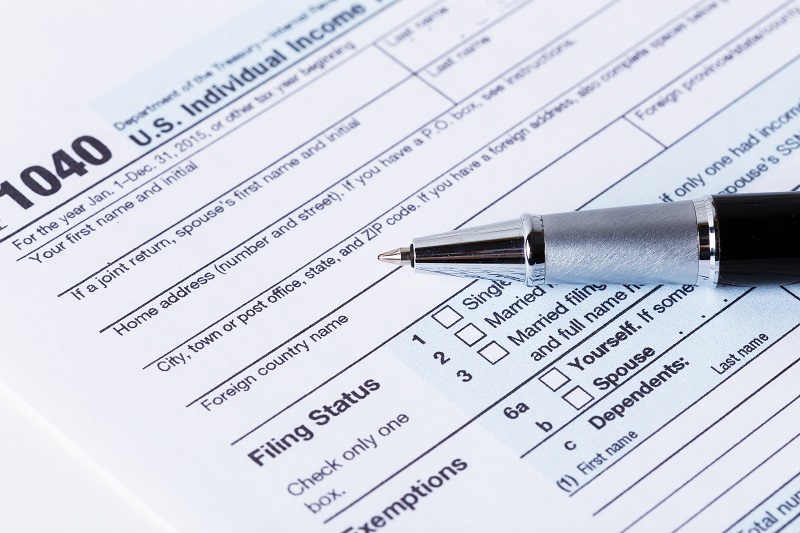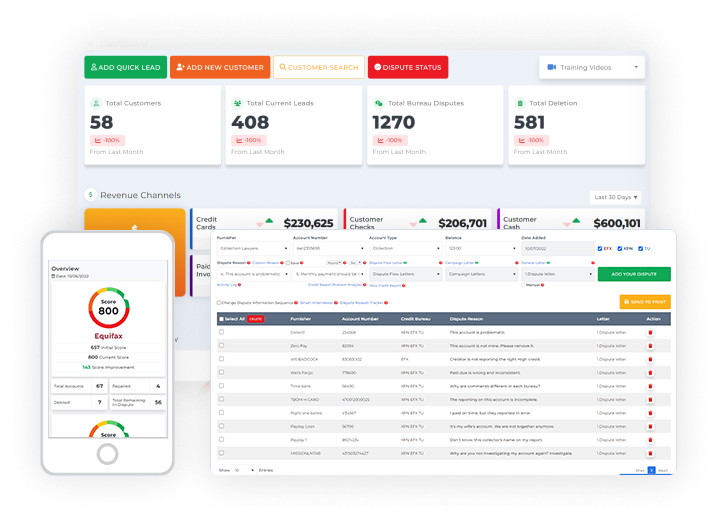As the credit repair industry continues to grow, it’s important for entrepreneurs to understand the legal landscape in Indiana. In this article, we’ll cover the key laws and regulations that apply to credit repair businesses in the state.
Choose a Business Structure

Decide whether you want to operate as a sole proprietor, partnership, limited liability company (LLC), or corporation. Each structure has different legal and tax implications.
Sole Proprietorship:
This is the simplest business structure, with the business owner being solely responsible for the business. There is no legal distinction between the owner and the business, which means the owner is personally liable for all debts and obligations of the business. This structure is easy to set up and has fewer regulatory requirements.
Partnership:
A partnership is formed when two or more people come together to operate a business. There are two types of partnerships: general partnerships (GP) and limited partnerships (LP). In a general partnership, all partners have equal management control and share responsibility for the debts and obligations of the business.
In a limited partnership, limited partners have limited liability and usually don’t participate in the management of the business, while general partners manage the business and have unlimited liability.
Limited Liability Company (LLC):
An LLC combines elements of a corporation and a partnership. It offers limited liability protection for its owners (called members), which means they are not personally responsible for the debts and obligations of the business.
LLCs offer flexibility in management and pass-through taxation, meaning the business profits or losses are reported on the owner’s personal tax return.
Corporation:
A corporation is a separate legal entity owned by shareholders. It provides limited liability protection for its owners, and ownership can be easily transferred through the sale of shares.
Corporations are subject to double taxation, meaning the profits are taxed at the corporate level, and dividends distributed to shareholders are taxed on their personal tax returns.There are different types of corporations, such as C corporations, S corporations, and Benefit corporations (B Corps).
Register Your Business

If you choose to form an LLC or corporation, register your business with the Indiana Secretary of State. You can do this online via the INBiz website.
Choose a Business Structure:
As mentioned earlier, decide whether to operate as a sole proprietorship, partnership, limited liability company (LLC), or corporation. Each structure has different legal and tax implications.
Name Your Business:
Choose a unique and suitable name for your credit repair business. Ensure it complies with Indiana’s business naming rules and is not already in use by another entity. You can check name availability through the Indiana Secretary of State’s website.
Register Your Business with the Indiana Secretary of State:
If you decide to form an LLC or corporation, you’ll need to register your business with the Indiana Secretary of State. You can do this online via the INBiz website.
- For an LLC, you’ll need to file Articles of Organization and pay the filing fee.
- For a corporation, you’ll need to file Articles of Incorporation and pay the filing fee.
If you are operating as a sole proprietorship or partnership, you may need to file an Assumed Business Name Certificate with the county recorder’s office in the county where your business is located.
Obtain an EIN:
Apply for an Employer Identification Number (EIN) from the Internal Revenue Service (IRS). You will need this number for tax purposes. You can apply for an EIN online through the IRS website .
Register for Indiana State Taxes:
Register with the Indiana Department of Revenue to obtain the required tax accounts, such as sales tax, withholding tax, and corporate income tax. You can register for these accounts through the INBiz website .
Obtain Any Required Licenses or Permits:
Depending on your specific activities and location, you may need to obtain additional licenses or permits. Check with your local city or county government office to determine which licenses or permits are necessary.
Obtain an EIN

Apply for an Employer Identification Number (EIN) from the Internal Revenue Service (IRS). You will need this number for tax purposes.
Determine Your Eligibility:
Ensure you meet the requirements for obtaining an EIN. You’ll need a valid Taxpayer Identification Number (TIN), such as a Social Security Number (SSN) or Individual Taxpayer Identification Number (ITIN).
Visit the IRS Website:
Go to the IRS EIN Assistant.
Apply Online:
The online application is available Monday through Friday from 7 a.m. to 10 p.m. Eastern Time. Follow the instructions on the website, provide the required information, and submit your application.
Receive Your EIN:
After completing the online application, you will receive your EIN immediately. Be sure to save or print a copy of the confirmation notice for your records.
If you Prefer Not to Apply Online, you can also Apply by Mail or Fax:
By Mail:
Complete Form SS-4 (Application for Employer Identification Number) and mail it to the address listed on the form. The processing time for mailed applications may take several weeks.
By Fax:
Complete Form SS-4 and fax it to the number listed on the form. You should receive your EIN within four business days.
Please note that the IRS does not charge a fee for obtaining an EIN.
Register for Indiana State Taxes

Register with the Indiana Department of Revenue to obtain the required tax accounts, such as sales tax, withholding tax, and corporate income tax.
Visit the INBiz Website:
Go to the INBiz website to access Indiana’s online business portal.
Create an Account:
If you haven’t already, create an INBiz account by clicking “Get Started” and following the instructions to sign up.
Log in to Your Account:
Once your account is set up, log in using your username and password.
Access the Business Tax Application:
On the INBiz dashboard, locate the “Business Tax Application” and click on it to start the registration process.
Complete the Application:
Fill in the required information about your credit repair business, including your business structure, EIN, and other relevant details. The application will guide you through the process of registering for the appropriate tax accounts, such as sales tax, withholding tax, and corporate income tax.
Submit the Application:
Review your information, and submit the application. You’ll receive confirmation from the Indiana Department of Revenue once your application has been processed.
Obtain Your Tax Account Numbers:
After your application is approved, you’ll receive tax account numbers for each account you registered. You’ll need these numbers to file tax returns and remit taxes to the Indiana Department of Revenue.
Remember to stay up-to-date on tax filing and payment deadlines, and file your tax returns as required by the Indiana Department of Revenue. You may also want to consult with an accountant or tax professional to help you navigate tax requirements for your credit repair business.
Obtain Any Required Licenses or Permits

Depending on your specific activities and location, you may need to obtain additional licenses or permits. Check with your local city or county government office to determine which licenses or permits are necessary.
Local Business License:
Depending on the city or county in which you operate, you may need a local business license to conduct business legally. Check with your local city or county government office to determine if a license is necessary and how to apply for one.
Surety Bond:
Indiana requires credit repair companies to obtain a surety bond of at least $25,000. This bond protects your clients in case your business does not fulfill its obligations. Contact a bonding company or insurance agency to obtain the necessary surety bond.
Credit Repair-Specific Licenses:
Indiana does not have a specific license for credit repair businesses. However, you must comply with both federal and state credit repair laws, including the Credit Repair Organizations Act (CROA) and Indiana’s laws related to credit repair services.
Professional Licenses:
If you plan to offer additional services, such as financial planning or legal advice, you may need to obtain professional licenses for those activities.
Zoning and Land Use Permits:
Depending on the location of your credit repair business, you may need to obtain zoning or land use permits. Check with your local city or county planning department to determine if your business location complies with zoning regulations and if any permits are required.
Building Permits:
If you plan to make any modifications to your office space, you may need to obtain building permits from your local city or county building department.
Signage Permits:
Depending on the location of your business and the type of signage you plan to use; you may need to obtain signage permits from your local city or county government office.
Please note that this is not an exhaustive list, and additional licenses or permits may be necessary depending on your specific situation.
Understand the Credit Repair Organizations Act (CROA)

Familiarize yourself with the CROA, a federal law that governs credit repair organizations. This law prohibits certain practices and requires specific disclosures to protect consumers.
The Credit Repair Organizations Act (CROA) is a federal law enacted in 1996 to regulate the credit repair industry and protect consumers from deceptive and unfair practices. The CROA is part of the Consumer Credit Protection Act, and its purpose is to ensure that credit repair organizations provide accurate information, operate transparently, and do not engage in fraudulent or misleading activities.
The CROA imposes several requirements and restrictions on credit repair organizations, including:
Prohibited Practices:
The CROA prohibits credit repair organizations from making false or misleading statements about their services, guarantees, or results. They are also not allowed to engage in any fraudulent or deceptive practices.
Advance Fee Ban:
Credit repair organizations cannot charge or receive payment for their services before they have completed the agreed-upon services. This prevents organizations from taking customers’ money without delivering on their promises.
Written Contracts:
The CROA requires credit repair organizations to provide customers with a written contract detailing the terms and conditions of their services. The contract must include a clear explanation of the services to be provided, the total cost, the time frame for achieving the promised results, and any guarantees.
Right to Cancel:
Customers have the right to cancel a credit repair contract without penalty or obligation within three business days of signing the contract. Credit repair organizations must inform customers of this right and provide a cancellation form.
Mandatory Disclosures:
The CROA requires credit repair organizations to provide a disclosure statement titled “Consumer Credit File Rights Under State and Federal Law” before signing any contract with a customer.
This statement informs consumers of their rights and the fact that they can repair their credit on their own without hiring a credit repair organization.
Recordkeeping:
Credit repair organizations must maintain detailed records of their contracts and transactions with customers for a minimum of two years.
Violations of the CROA can result in civil penalties, such as fines, injunctions, or even criminal prosecution in severe cases. Consumers who have been harmed by a credit repair organization’s violation of the CROA can sue for damages, attorney’s fees, and other relief.
Understand Indiana State Laws

Familiarize yourself with Indiana’s credit repair regulations. Some states have specific laws governing credit repair businesses, while others follow federal law.
Compliance with Federal Law:
Credit repair businesses in Indiana must comply with the federal Credit Repair Organizations Act (CROA), which regulates credit repair organizations and protects consumers from deceptive and unfair practices.
Prohibition of Deceptive Practices:
Credit repair businesses must not engage in deceptive practices, such as making false or misleading statements about their services, guarantees, or results. Additionally, they should not engage in any unfair or fraudulent practices.
Compliance with Advertising Laws:
Credit repair businesses must comply with Indiana’s advertising laws (IC 24-4-1) which prohibit false, misleading, or deceptive advertising.
Contracts and Disclosures:
Credit repair businesses should provide customers with written contracts detailing the terms and conditions of their services, as required by the CROA.
They should also provide any mandatory disclosures outlined in the CROA, such as the “Consumer Credit File Rights Under State and Federal Law” disclosure statement.
Compliance with General Business Laws:
Credit repair businesses must follow Indiana’s general business laws, such as registering their business with the Indiana Secretary of State, obtaining any required licenses or permits, and complying with applicable tax laws.
Surety Bond:
Indiana requires credit repair companies to obtain a surety bond of at least $25,000. This bond protects clients in case the business does not fulfill its obligations. Contact a bonding company or insurance agency to obtain the necessary surety bond.
The Indiana Credit Services Organization law, as found under Indiana Code (I.C.) Title 24, Article 5, Chapter 15 (I.C. 24-5-15-1 et seq.), regulates credit services organizations operating in Indiana.
Credit services organizations are businesses that provide or claim to provide, services to improve a buyer’s credit record, history, or rating. This law aims to protect consumers from deceptive practices and ensure that credit services organizations operate transparently and honestly.
Under the Credit Services Organizations law, businesses must adhere to certain requirements and restrictions:
Registration:
Credit services organizations must register with the Attorney General’s office before conducting business in Indiana. The registration process includes submitting a registration statement, which contains information about the organization and its owners or officers.
Surety Bond:
Credit services organizations are required to obtain a surety bond of at least $25,000 to operate in Indiana. This bond is meant to protect consumers in case the organization fails to comply with the provisions of the law.
Prohibited Acts:
Credit services organizations are prohibited from engaging in misleading or deceptive practices, making false statements, or omitting material facts. They are also not allowed to charge or receive any money before completing the agreed-upon services.
Written Contract:
Credit services organizations must provide buyers with a written contract that includes a detailed description of the services to be provided, the total amount to be paid by the buyer, and the date by which the services are to be completed.
Buyers have the right to cancel the contract within three days of signing without any penalty or obligation.
Mandatory Disclosures:
Credit services organizations are required to provide buyers with a notice of their rights under the Credit Services Organizations law.
This notice informs buyers of their rights and the fact that they can improve their credit record, history, or rating on their own without hiring a credit services organization.
Record Keeping:
Credit services organizations must maintain records of their contracts with buyers for at least two years.
Enforcement:
The Attorney General’s office is responsible for enforcing the provisions of the Credit Services Organizations law. Violations can result in civil penalties, injunctions, or other remedies provided by law.
Surety Bond

Indiana requires credit repair companies to obtain a surety bond of at least $25,000. This bond protects your clients in case your business does not fulfill its obligations.
The Indiana Credit Services Organization Surety Bond is required by the Office of the Indiana Attorney General. The required bond amount is $25,000. The bond remains in full force and effect indefinitely.
Establish a Trust Account
Open a trust account to hold your clients’ funds. Indiana law requires credit repair companies to maintain a separate trust account for clients’ funds.
Research Banks and Credit Unions:
Begin by researching banks and credit unions in Indiana that offer trust or escrow accounts. You may want to compare their fees, minimum balance requirements, and any additional services they provide.
Consult with an Attorney or Accountant:
Speak with an attorney or accountant to get advice on the specific requirements for establishing and managing a trust account for a credit repair business. They can help you navigate any legal or accounting issues that may arise.
Choose a Bank or Credit Union:
Select a bank or credit union that offers trust accounts and meets your business needs. Keep in mind that the financial institution must be authorized to do business in Indiana.
Gather Required Documents:
Prepare any required documentation to open the trust account, such as your business registration documents, Employer Identification Number (EIN), and any relevant licenses or permits.
Open the Trust Account:
Visit the bank or credit union in person or inquire about opening the account online. Provide the required documentation and complete any necessary paperwork to open the trust account.
Deposit Client Funds:
Deposit client funds into the trust account as required. Ensure that you maintain accurate records of all transactions, including deposits, withdrawals, and transfers.
Manage the Trust Account:
Keep the trust account separate from your business’s operating account and use it exclusively for holding client funds. Regularly review the account statements and reconcile them with your internal records to ensure accuracy.
Comply with Any Reporting Requirements:
Depending on your industry or specific circumstances, you may need to comply with certain reporting requirements for trust accounts. Consult with an attorney or accountant to ensure that you meet any such requirements.
Draft a Client Contract

Develop a client contract that complies with Indiana and federal credit repair laws. The contract should include all legally required disclosures and provisions.
Identify the Parties:
Clearly identify your credit repair business and the client in the contract. Include the full legal names, addresses, and contact information for both parties.
Scope of Services:
Clearly define the specific credit repair services you will provide, such as disputing inaccurate items, negotiating with creditors, or providing credit counseling. Be specific and detailed in your description of the services.
Duration of the Contract:
State the duration of the contract and when the services will begin and end. Specify any conditions for extending or terminating the contract.
Guarantees and Disclaimers:
If you provide any guarantees for your services, clearly outline the terms and conditions of those guarantees.
Include any disclaimers or limitations of liability, keeping in mind that you cannot make false or misleading statements about your services or results.
Cancellation Rights:
Under the CROA, clients have the right to cancel a credit repair contract within three business days of signing without penalty or obligation. Include a provision in your contract that explains this right and provide a cancellation form that clients can use to exercise this right.
Mandatory Disclosures:
Include the mandatory disclosure statement required by the CROA, titled “Consumer Credit File Rights Under State and Federal Law.” This statement informs clients of their rights and the fact that they can repair their credit on their own without hiring a credit repair organization.
Governing Law and Dispute Resolution:
Specify that the contract is governed by Indiana state law and federal credit repair laws. Include any dispute resolution provisions, such as arbitration or mediation, if applicable.
Signatures and Dates:
Ensure that both parties sign and date the contract to indicate their agreement to its terms.
Set Up Your Office

Choose a location for your business, and ensure it meets any zoning or regulatory requirements.
Determine Your Office Needs:
As mentioned earlier, consider your business needs and the type of services you will provide to determine what type of office space you need.
Choose a Location:
Indiana does not have specific requirements for the location of credit repair businesses, but it’s important to select a location that is convenient for both you and your clients.
Secure a Lease:
If you’re renting office space, ensure that the lease agreement includes all the necessary terms and conditions. Additionally, some landlords may require you to obtain liability insurance before renting office space.
Set Up Your Office:
Once you have secured your office space, set it up according to your business needs. Remember that you will need to comply with any applicable building codes, zoning regulations, and fire safety requirements.
Register Your Business Address:
If you’re using a physical office, you must register your business address with the Indiana Secretary of State and other relevant agencies. You can register your business address during the business registration process.
Obtain Any Required Permits or Licenses:
Depending on your location and the type of services you provide; you may need to obtain certain permits or licenses to operate your credit repair business in Indiana.
For example, if you plan to collect or use personal information about clients, you may need to register as a “data broker” with the Indiana Attorney General’s Office.
Advertise Your Office:
Once your office is set up, you can start advertising your services to attract clients. It’s essential to comply with Indiana’s advertising laws, which prohibit false, misleading, or deceptive advertising.
Market Your Business

Develop a marketing plan to reach potential clients. Consider creating a website, using social media, and networking with other professionals in the credit and finance industry.
Build a Strong Online Presence:
Establish a website and social media profiles to promote your credit repair services online. Ensure that your website is user-friendly, informative, and compliant with state and federal laws.
Use search engine optimization (SEO) techniques to improve your website’s visibility and attract more traffic.
Utilize Online Advertising:
Use paid online advertising, such as Google AdWords or Facebook ads, to reach your target audience. Ensure that your ads comply with Indiana’s advertising laws and do not make false, misleading, or deceptive claims.
Network with Other Professionals:
Build relationships with professionals in related industries, such as real estate agents, mortgage brokers, and financial advisors. They may refer clients to your credit repair business, helping you expand your reach and grow your client base.
Attend Industry Events:
Attend industry events, such as credit repair conferences, to network with other professionals and promote your services. This can help you establish your business as a credible and reputable provider of credit repair services.
Offer Educational Resources:
Provide educational resources, such as articles, webinars, and e-books, to inform clients about credit repair and financial literacy. This can help build trust with potential clients and position your business as an authority in the industry.
Leverage Customer Referrals:
Encourage satisfied clients to refer their friends and family to your credit repair business. Word-of-mouth referrals can be a powerful marketing tool and can help you attract new clients.
Stay Up-to-Date

Regularly review federal and state laws to ensure compliance with any updates or changes. This will help you maintain a reputable and compliant business.
Subscribe to Industry News and Updates:
Sign up for newsletters, blogs, and other sources of industry news to stay informed about any updates or changes to credit repair laws at the federal and state levels.
Attend Relevant Events and Conferences:
Attend industry events, such as credit repair conferences and legal seminars, to stay up to date on the latest trends and changes in the credit repair industry.
Consult with Attorneys and Other Experts:
Consult with attorneys and other experts who specialize in credit repair and related fields to stay informed about any legal changes or updates that could affect your business.
Join Industry Associations:
Join industry associations, such as the National Association of Credit Services Organizations (NACSO), to stay connected with other credit repair professionals and stay informed about industry trends and updates.
Review Your Contracts and Policies Regularly:
Review your contracts, policies, and procedures regularly to ensure that they comply with any updates or changes to federal and state laws.
Conduct Regular Compliance Audits:
Conduct regular compliance audits to identify any areas of your business that may not be compliant with federal and state laws. This can help you address any compliance issues proactively and avoid potential legal problems.
Train Your Employees:
Train your employees on federal and state credit repair laws and ensure that they are aware of any updates or changes that may affect your business.
Ready to start your credit repair business in Indiana?
Make sure you are informed and compliant with the latest state laws.
Click now to learn more.
Now that you have a better understanding of the laws and regulations governing credit repair businesses in Indiana, you’re better equipped to start and run a successful and compliant operation. Remember to stay up-to-date with any changes in the legal landscape, and always prioritize transparency and integrity in your business practices.
Bonus: Now that you have read this article, why not take your new skill and start your own credit business helping others? We have free training that can help you do just that.



